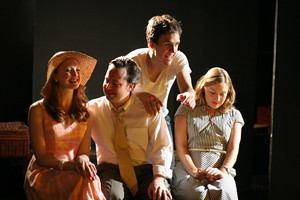 K.L. ThomasEmily Bennett, Jeff Sproul, Annelise Rains and John Hardin in The Horse Trade Theatre Group’s “Lines”
K.L. ThomasEmily Bennett, Jeff Sproul, Annelise Rains and John Hardin in The Horse Trade Theatre Group’s “Lines”When was the last time you went to a play where you were asked to sign a petition to release a political prisoner before getting to your seat? “The play deals with human rights, so it makes sense that we would be here,” the woman from Amnesty International explained to me. “The script is very powerful.” With these words and director Heidi Grumelot’s introduction emphasizing the play’s interest in social justice, “Lines” was framed: I was ready to have my mind blown by some political theater.
And yet, if I hadn’t been told the play was about human rights, I’m not sure I would have known.
“Lines” is set in an imaginary country where an actual line has been drawn, segregating blacks from whites. On one side of the line is white funeral director Doc; on the other is Bullet, a black football coach. Their lives get intertwined in scandal when a young black man, Keys, dies on the “white” side. Doc’s decision to bury Keys, which breaks the town’s segregation laws, leads to a series of mix-ups and subplots — some funny, some somber.
Terence Patrick Hughes’ dense and ambitious script explores heavy subject matter with humorous dialogue and strong characters. The play begins in the cosmos. The moon, played by lovable Amanda Van Nostrand, is getting sized up by a wily, overconfident star played by Reiss Gaspard: “You sure do have nice infinite positioning,” he flirts. But she stays loyal to the sun, who “warms” her up (via a bright, yellow stage light) and speaks to her with the protracted, comical honks of a horn.
As sweet as these interstellar interludes were, the rest of the play felt a little overwhelmed by its far-reaching thematic scope. The same actors who play the star and the moon also play Bullet and Girly, respectively. Along with the other lead, Matthew Wise as the corruptible Doc, they find themselves mixed up in a number of complicated subplots that never entirely gain steam. The eponymous “line” that divides the town’s blacks and whites (also ascending the stairs of the Red Room to divide the audience to tepid effect), also serves to quarantine the town’s black residents afflicted by a sexually transmitted virus that turns them into zombies.
Behind the segregation mandate is the town’s heartless, fast-talking white mayor, a well-drawn archetype straight out of a fifties caper, who enacts the play’s climactic final scene involving a racially motivated, murderous scheme to upend the outcome of a football game. And if that weren’t enough plot and characters to keep track of, we also have the verbose deacon who accuses Bullet of sexual abuse; Doc’s social-climbing, emasculating Southern-belle wife; and the bereaved white Girly, who started it all by bringing her bloodied black lover, Keys, onto the wrong side of the line.
“Lines” approaches familiar American tropes: the play could be boiled down to race, religion and football. But even though we are in familiar territory, the myriad storylines left me confused and disoriented. Is this a parable about segregation in the US? A social comment on AIDS in the black community? A noirish thriller? And what do the sun, moon and stars have to do with it all?
“Lines” at the Red Room (85 East Fourth Street between the Bowery and Second Avenue) through August 30. Tickets $18. Visit www.horsetrade.info or call 212-868-4444.



